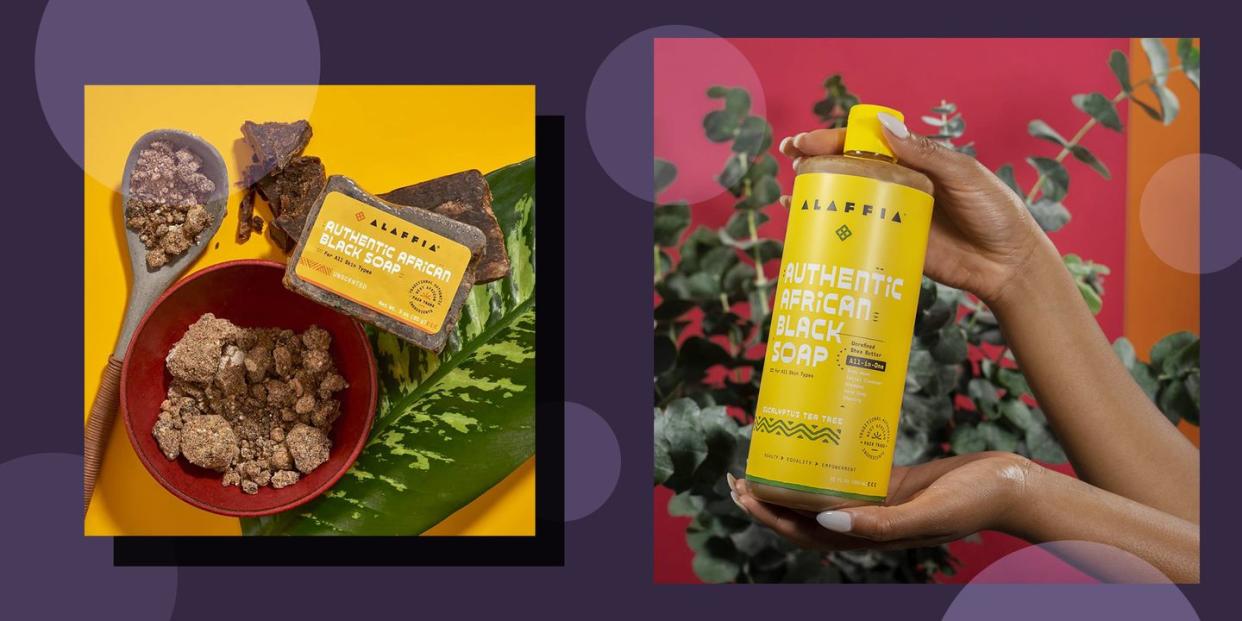African Black Soap Is the One Skincare Ingredient Your Pores Are Begging For

You've tried face creams, serums, sheet masks, and more to try and clear up a variety of skin issues, but how many times have we turned to Mother Earth for the answer? News flash: There’s an array of botanical skincare ingredients that can help calm down nearly any skin-related situation, and you're probably missing out on them.
Here's one of our favorites: African black soap. This skincare multihyphenate does just about everything that your whole skin routine can, in just one simple ingredient. Below, we dive deep into this skincare wunderkind with board-certified dermatologist, Peterson Pierre, M.D., of the Pierre Skin Care Institute — plus, we share a few of our favorite African black soap-infused skincare products.
What Is African Black Soap?
"Standard soaps are synthetic, while African black soap is handmade from plant-based ingredients found in Africa," says Pierre. "It's usually a combination of coconut oil, shea butter, plantain bark, cocoa pods, and palm tree leaf derivatives such as palm oil and palm kernel oil. The formula is dependent on the African region it's derived from. Some black soaps have additional ingredients such as essential oils, oatmeal, and aloe vera."
Nearly all African black soaps are raw or are made out of all-natural formulas, but there’s one thing to be aware of: fake African black soaps. While most are made out of naturally derived ingredients from Ghana, Nigeria, and other African regions, many fake formulations will be clouded with red-flag chemicals like parabens, sulfates, artificial fragrances, and preservatives. So, make sure you read the ingredient label before you buy!
The Benefits of African Black Soap
According to Pierre, African black soap has myriad skincare benefits. He notes that African black soap has antibacterial, anti-fungal, and anti-inflammatory properties, making it great for anyone who suffers from chronic acne, and it can be helpful in improving skin tone and texture.
"African black soap has anti-inflammatory, antibacterial, as well as moisturizing properties, all of which should be very beneficial for patients with rosacea," he says. "African black soap has the potential ability to regulate oil production, all of which should be very beneficial if you suffer from acne. Its anti-inflammatory and moisturizing properties make it safe to use on all parts of the body, including the face, and it's also safe for all skin types."
So, how can this clarifying pick also moisturize your skin?
"It's anti-inflammatory, largely due to its high content of vitamins A and E, and it's moisturizing because it contains shea butter and coconut oil, but it won't make your skin oily," Pierre notes. "Combine this with its anti-inflammatory properties, African black soap can help soothe irritation caused by eczema, psoriasis, and allergic skin reactions."
However, before you get too excited, Pierre notes that African black soap's rough texture could be pretty intense the first time you try it.
"Natural African black soap has a rough texture, so please be gentle when you first start using it," he says. "You may want to begin using it 3 days a week until you get acclimated to it. Alternatively, you can rub it into a washcloth, which will smooth the soap while allowing you to use the washcloth gently on your skin. If you use the bar of soap, use gentle, circular motions with little pressure. No need to scrub."
Now, if you're ready to give African black soap a try, take a look at some of our favorite picks below:
Read More:
The Benefits of Niacinamide, and Why You Need Some on Your Skin ASAP
The Best Anti-Aging Serums According to Skin Experts
Is Bakuchiol the Skincare Ingredient That You've Been Missing?
Follow BestProducts.com on Facebook, Instagram, Twitter, and Pinterest!
You Might Also Like


